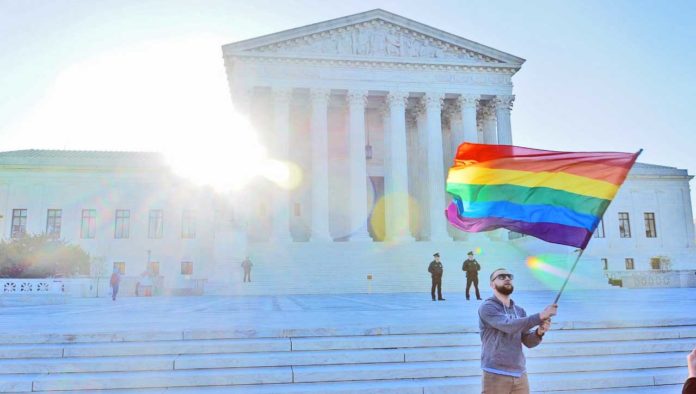The U.S. Supreme Court ruled on June 15 that gay and transgender employees are protected against workplace discrimination under Title VII of the 1964 Civil Rights Act on the basis of sex. The ruling makes it illegal for employers to fire workers for being gay or transgender.
The landmark 6-3 opinion authored by Trump-appointee Neil Gorsuch was both shockingly unexpected and abjectly thrilling. Joining Gorsuch were Chief Justice John Roberts and the four liberal justices: Ruth Bader Ginsburg, Elena Kagan, Sonia Sotomayor and Stephen Breyer. Those four justices wrote no concurring opinions — they let Gorsuch’s resounding endorsement of LGBTQ rights stand in bold rejection of the Trump administration’s arguments against LGBTQ rights.
Gorsuch, a strict textualist, wrote, “In Title VII, Congress adopted broad language making it illegal for an employer to rely on an employee’s sex when deciding to fire that employee. We do not hesitate to recognize today a necessary consequence of that legislative choice: An employer who fires an individual merely for being gay or transgender defies the law.”
The ruling is breathtakingly good. Yet my excitement over the decision was tempered by knowing that two of the plaintiffs in the case — Donald Zarda, a gay man, and Aimee Stephens, a trans woman — had died before it came in. And then there was my own history, as well as those of people in the many news stories and interviews I have written over several decades about LGBTQ employment discrimination and how it has defined the lives of its victims.
I was 19 the first time I was fired from a job for being a lesbian. I was a work-study student at Temple University on an academic scholarship. The job — I was assisting in interviews of parents for a long-term study on child development — was essential to both my scholarship and paying my bills. My boss had said simply that “parents had complained” about having “someone like that” in their homes.
Someone like THAT. Someone openly gay.
A few years later, I was fired from my first job as an editor at an academic press for being a lesbian. Again, the language was purposefully euphemistic. “We heard your radio program [I was co-host of “Amazon Country,” the nation’s first lesbian radio program on WXPN-FM]. We think you will agree that the values of that program and the press’ values are inconsistent. We would like you to leave tomorrow. Please clear out your office.”
I would be fired for being gay a few more times throughout my 20s: My private persona as a lesbian activist who often appeared on local radio and TV news programs was, apparently, at odds with staid positions as writer and editor in the mainstream.
The loop tape of my own firings and those of lovers and friends over the years played in my head when the announcement of the Supreme Court decision came in. The real-world consequences of such firings have often been devastating. I experienced a brief stint of homelessness after one job loss, as have other lesbians and trans people I’ve known over the years. Two former partners of mine — gender non-conforming butch lesbians only in their 40s — had died of treatable cancers that metastasized because they lost their health insurance after being fired for being gay.
As a reporter, I have covered myriad stories in just the past decade of the epidemic of firings of lesbian teachers. The circumstances are uniformly similar: a lesbian gets married and/or becomes pregnant and is fired for violating code of conduct rules extrapolated to weed out lesbian teachers.
Just last year, my own wife was fired from a teaching position she had held for a dozen years when the new director of the program — an evangelical Christian — decided that she was too obviously queer for the institution.
Conservative outrage over the SCOTUS ruling was swift and aggrieved. Justice Samuel Alito’s dissent can only be described as petulant, while Carrie Severino, president of the conservative organization Judicial Crisis Network who previously clerked for conservative Justice Clarence Thomas, said the late Justice Antonin Scalia “would be disappointed that his successor has bungled textualism so badly today, for the sake of appealing to college campuses and editorial boards.” As if the lives of lesbians, gay men and trans people are some frivolous cocktail party chatter.
Evangelical leader and Trump spiritual advisor Franklin Graham lamented how God would be disappointed with Gorsuch and the other justices. Graham said that his rights to religious freedom — which apparently include being able to fire gay and trans people — were violated by the “activist” ruling.
Gorsuch acknowledged those arguments, noting, “How these doctrines protecting religious liberty interact with Title VII are questions for future cases, too.” This means Graham’s polemic is bound to find its way back to the SCOTUS over time.
Yet it is unusual for the SCOTUS to reverse civil rights law. So for now and perhaps always, millions of LGBTQ Americans can exhale for the first time in their working lives, knowing they are finally protected under law.
